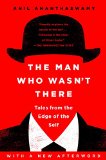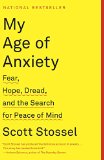Summary | Excerpt | Reading Guide | Reviews | Beyond the book | Read-Alikes | Genres & Themes | Author Bio

A True Story of Family, Face-Blindness and Forgiveness
by Heather SellersI've never really trusted the old adage "You can't judge a book by its cover." Often, you can; at the very least, you can gauge a sense of which publishers hire the most talented designers. Helen Yentus's cover for this intriguing memoir perfectly distills its essence by portraying three cornhusk dolls (child, mother, and father) against a blue floral backdrop, thus conveying both coziness and unease. Cornhusk dolls have no facial features: you can only intuit what they are meant to represent by their size and attire. Consequently, before readers even open this book, they have some idea of what it would be like to live with face blindness, to be forced to discern a person's identity by shape and context alone.
The world of face blindness that Heather Sellers shows readers in her memoir is a frightening one, initially fraught with embarrassment and isolation on the author's part and a mixture of bemusement and anger on the part of the unrecognized. Early in the narrative, Sellers sets the scene for her pivotal return to her native Orlando with her fiancé and his two teenage sons; the visit is supposed to forge a bond between her troubled past with her eccentric parents and her promising future with a man who, despite his own personal problems, loves her and has welcomed her into his family. Waiting in line at a drugstore the night before the trip, she is startled by the approach of a boy who stands so close to her that she fears he will steal her purse. After running away from him and crying out for a security guard, she discovers that this is one of her fiancé's sons, merely wanting to know if she'll buy him a snack. Although they laugh it off as one of her unique quirks ("This kind of confusion had happened before. Sometimes I didn't seem to recognize the boys."), the scenario replays itself with alarming regularity, with Sellers often failing to recognize her fiancé, her colleagues at the college where she teaches, and, in one mortifying faux pas, an important committee member sitting near her at a restaurant while her friend loudly derides him as "a stupid, stupid man." Sellers' limpid writing style and raw honesty make these passages painful to read, revealing a likeable woman whose inability to interpret the social cues that most of us take for granted has led to reclusiveness as well as a potent fear of madness.
That fear makes sense when we finally meet her separated mother and father, who each scare away the new family to which Sellers so badly wants to belong. In a series of flashbacks, Sellers portrays an adolescence spent bouncing back and forth between two dysfunctional homes, the one ruled by her mother's undiagnosed paranoid schizophrenia, the other by her alcoholic father's erratic behavior. A chance remark by an old boyfriend at her high school reunion during that same disastrous trip home catalyzes a whirlwind of research into schizophrenia and its possible implications for her facial recognition problems, adding an element of neurological sleuthing to the memoir.
While the latter half of the book occasionally wobbles in its attempt to address both narrative strands (the emphasis on Internet research, neurological tests, and ultimate diagnosis of prosopagnosia sometimes threatens to overwhelm the story of Sellers' upbringing and its effects on her marriage), this approach works well overall, unifying what could have been two distinct memoirs into a generally satisfying whole. Most powerfully, the author comes to see her disorder as more blessing than curse, as "the ability to live with uncertainty, to be receptive to all that a person might turn out to be, literally and metaphorically." In the midst of painful circumstances that would have broken some people, she displays a grace and wisdom that allows her to navigate the world with a renewed sense of vision.
![]() This review was originally published in The BookBrowse Review in February 2011, and has been updated for the
November 2011 edition.
Click here to go to this issue.
This review was originally published in The BookBrowse Review in February 2011, and has been updated for the
November 2011 edition.
Click here to go to this issue.

If you liked You Don't Look Like Anyone I Know, try these:

by Anil Ananthaswamy
Published 2016
A tour of the latest neuroscience of schizophrenia, autism, Alzheimer's disease, ecstatic epilepsy, Cotard's syndrome, out-of-body experiences, and other disorders—revealing the awesome power of the human sense of self from a master of science journalism

by Scott Stossel
Published 2015
A riveting, revelatory, and moving account of the author's struggles with anxiety, and of the history of efforts by scientists, philosophers, and writers to understand the condition.
Life is the garment we continually alter, but which never seems to fit.
Click Here to find out who said this, as well as discovering other famous literary quotes!
Your guide toexceptional books
BookBrowse seeks out and recommends the best in contemporary fiction and nonfiction—books that not only engage and entertain but also deepen our understanding of ourselves and the world around us.